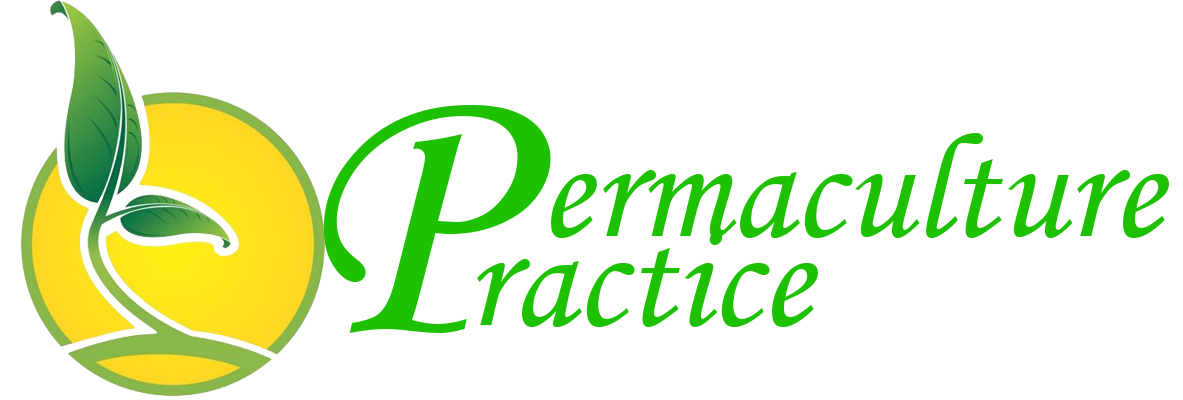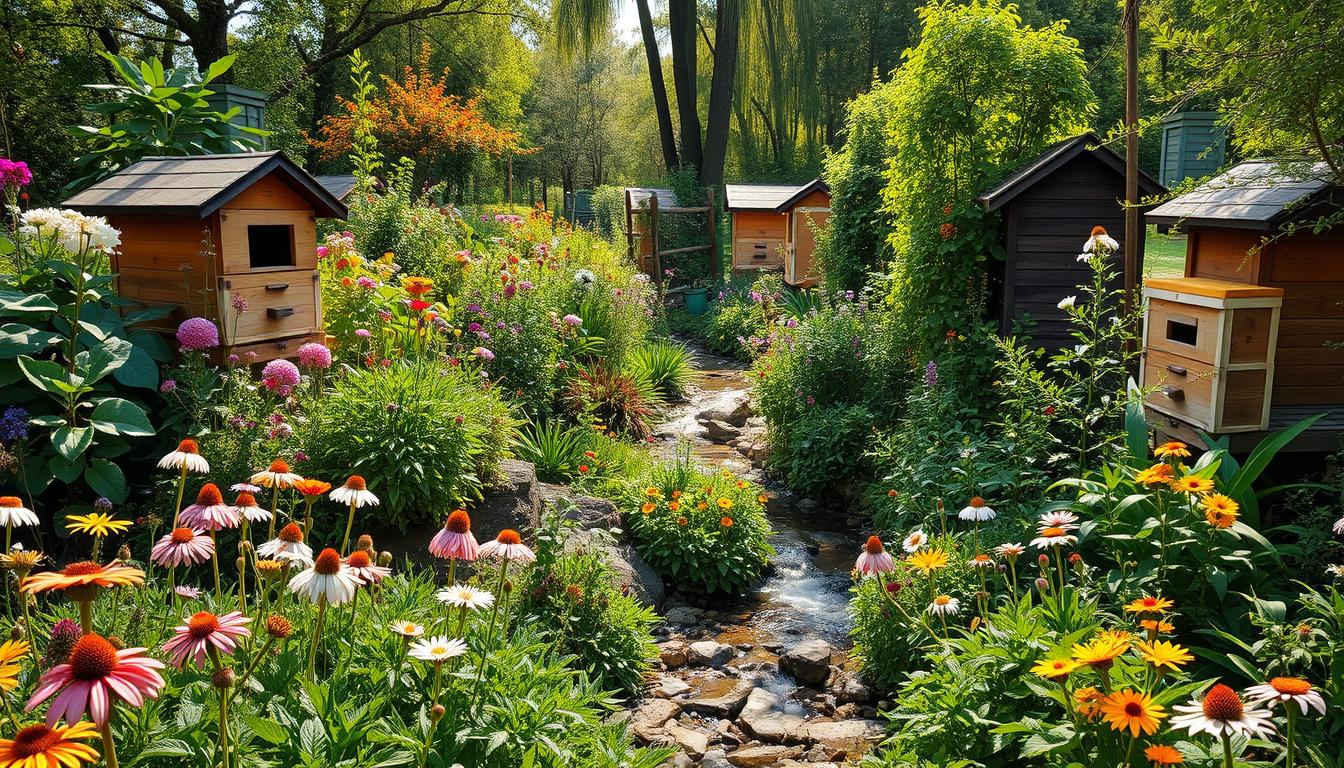According to Forbes, bee populations are reported to be growing, a surprising statistic that underscores the importance of sustainable beekeeping practices. , a holistic approach to managing hives, offers a natural solution to support healthy bee colonies and promote ecological balance. By integrating techniques with permaculture principles, beekeepers can cultivate while preserving the delicate balance of our ecosystems.
Permaculture, a sustainable approach to gardening and land management, recognizes the vital role of bees as pollinators. In a permaculture system, are employed to foster thriving bee populations, contributing to the overall health and diversity of the surrounding environment. This article explores the benefits of , , and the creation of through .
The Importance of Pollinators in Permaculture
Pollinators, particularly bees, play a crucial role in the success of a permaculture system. These tireless workers are responsible for pollinating a vast majority of the world’s crops and wild plants, making them indispensable components of a healthy, balanced ecosystem. However, the pollinator population has been on the decline in recent years, posing a serious threat to the delicate balance of our natural world.
Bees: Nature’s Hardest Workers
Bees are often referred to as nature’s hardest workers, and for good reason. These industrious insects are responsible for pollinating an estimated 80% of the 264 cultivated plant species in Europe, contributing to a staggering €260 billion in annual global agricultural production. Without bees, our food supply and the overall health of the bee ecosystem would be in grave danger.
The Declining Pollinator Population
Despite their crucial role, the population of pollinators has been declining at an alarming rate in recent decades. Factors such as habitat loss, exposure to synthetic pesticides, and the impacts of climate change have all contributed to this worrying trend. Intensive agricultural practices and the overuse of chemicals have significantly impacted pollinator populations and their species diversity.
Permaculture beekeeping aims to address this issue by creating a sustainable and natural environment for bees to thrive. By adopting pollinator conservation practices and promoting bee ecosystem health, permaculture enthusiasts can play a vital role in reversing the pollinator decline and restoring the delicate balance of our natural world.
What is Permaculture Beekeeping?
Permaculture beekeeping is a holistic approach to apiculture that aligns with the principles of permaculture – a design system focused on working in harmony with nature. This sustainable method of beekeeping emphasizes the use of natural, eco-friendly techniques to support healthy bee populations and promote responsible honey production. Permaculture beekeepers strive to create a balanced ecosystem that provides bees with the resources they need to thrive, while minimizing human interference and reliance on synthetic inputs.
At the heart of permaculture beekeeping lies the recognition that bees are an integral part of the natural world, playing a crucial role in the pollination and maintenance of diverse ecosystems. By adopting permaculture practices, beekeepers can foster a mutually beneficial relationship with these hard-working pollinators, ensuring the long-term sustainability of both the bee colonies and the surrounding environment.
“Bees may face challenges due to agricultural chemicals and glyphosate found in pollen and nectar, leading to adverse effects on the hive and bee population.”
Unlike conventional beekeeping methods that often rely on synthetic treatments and interventions, permaculture beekeeping emphasizes a gentler, more holistic approach. This includes using natural materials for hive construction, minimizing disturbances to the colony, and promoting the bees’ natural foraging and hive-building behaviors. By following these principles, permaculture beekeepers can create a thriving, self-sustaining apiary that supports the overall health and well-being of the bee population.
Permaculture beekeeping is a growing movement that recognizes the crucial role bees play in maintaining the delicate balance of our ecosystems. By embracing sustainable and natural practices, beekeepers can contribute to the conservation of these essential pollinators while also enjoying the rewards of permaculture beekeeping, sustainable beekeeping, and natural beekeeping.
Benefits of Permaculture Beekeeping
Permaculture beekeeping offers a wealth of benefits, from sustainable honey production to the promotion of pollinator biodiversity. By embracing natural methods and creating a thriving environment for bees, permaculture beekeepers can harvest honey without compromising the health and wellbeing of the hive. Moreover, the presence of a diverse population of bees and other pollinators plays a crucial role in maintaining the ecological balance of the surrounding ecosystem, supporting a wide range of plant and animal species.
Sustainable Honey Production
Permaculture beekeeping emphasizes sustainable honey production practices that prioritize the long-term welfare of the bee colony. By understanding and respecting the natural rhythms and needs of bees, permaculture beekeepers can harvest honey in a way that is gentle, non-invasive, and ensures the continued vitality of the hive. This approach not only results in a high-quality, sustainable honey but also helps to preserve the delicate balance of the ecosystem.
Promotion of Biodiversity
A thriving permaculture beekeeping system can have a profound impact on the overall pollinator biodiversity of the surrounding area. By creating a diverse, pesticide-free habitat that caters to the needs of bees and other pollinators, permaculture beekeepers can support the flourishing of a wide range of species, from butterflies and moths to birds and small mammals. This, in turn, contributes to the ecological balance of the local ecosystem, fostering a healthier, more resilient environment for all.
Through the adoption of permaculture principles, beekeepers can reap the rewards of sustainable honey production while playing a vital role in the preservation of our precious pollinators and the delicate balance of nature.
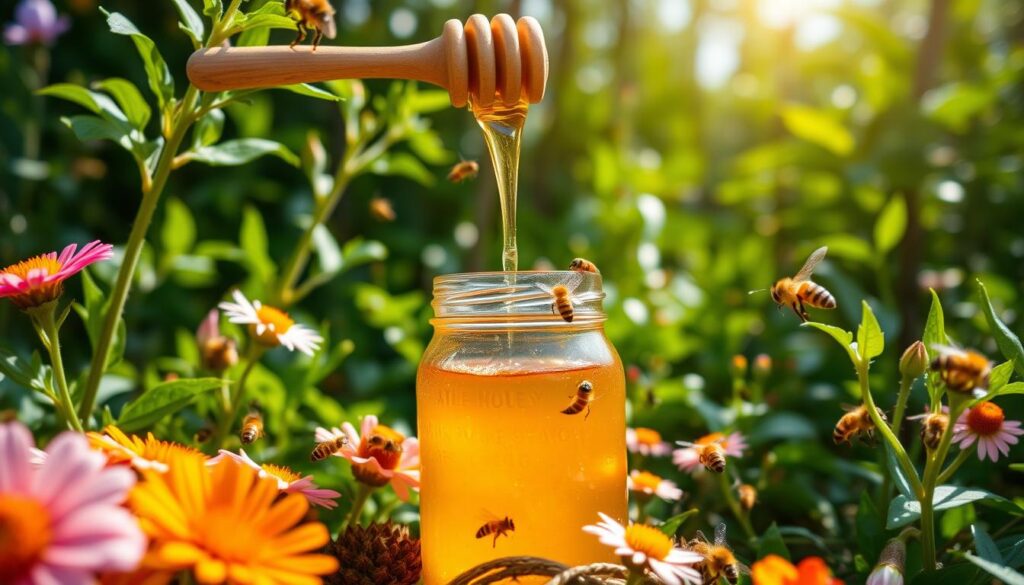
Creating a Bee-Friendly Permaculture Garden
Establishing a pollinator-friendly permaculture garden is essential for supporting bees and other vital pollinators in your local ecosystem. By planting a diverse array of nectar-rich bee-friendly plants and herbs, you can provide these hard-working insects with a reliable source of food and shelter throughout the growing season. This, in turn, helps to create a thriving, diverse habitat that supports the overall health and well-being of the local pollinator population.
Planting Pollinator-Friendly Flowers and Herbs
When it comes to pollinator-friendly gardening, the key is to choose a wide variety of plants that bloom at different times of the year. This ensures that your garden provides a continuous source of nourishment for bees and other pollinators. Some excellent options include lavender, sunflowers, rosemary, and echinacea, all of which are known for their nectar-rich flowers and ability to attract a diverse range of pollinating insects.
“Bees can flourish in a backyard environment when natural beekeeping methods are employed.”
In addition to flowering plants, incorporating bee-friendly herbs into your permaculture landscaping can also be highly beneficial. Herbs such as thyme, mint, and oregano not only provide food for pollinators but also add depth and character to your garden’s overall aesthetic. By combining these elements, you can create a vibrant, thriving oasis that supports the local ecosystem while also enhancing the beauty of your outdoor space.
Natural Beekeeping Methods
Permaculture beekeeping embraces the use of natural, low-impact methods that prioritize the well-being of bees over maximizing honey production. Two prominent hive designs in this approach are top bar hives and Warre hives, which closely mimic the natural nesting habits of bees.
Top Bar Hives
Top bar hives allow bees to build their own comb in a horizontal orientation, as they would in a natural tree cavity. This design gives the colony more control over the size and structure of their hive, supporting their natural behaviors and colony health. By using top bar hives, permaculture beekeepers can minimize disruption to the bees and foster a more harmonious relationship between humans and their pollinator partners.
Warre Hives
Developed by a French monk, Warre hives are another natural beekeeping method that aligns with the bees’ natural nesting preferences. These hives feature smaller, stackable boxes that mimic the vertical cavities bees prefer. Warre hives also allow for natural comb construction, empowering bees to define their own cell sizes and colony structure. The Warre approach advocates for minimal maintenance, with inspections ideally conducted just once a year before honey harvesting.
By embracing natural beekeeping methods like top bar hives and Warre hives, permaculture beekeepers can support the health and resilience of bee colonies while producing honey in a sustainable and ecologically-minded way.
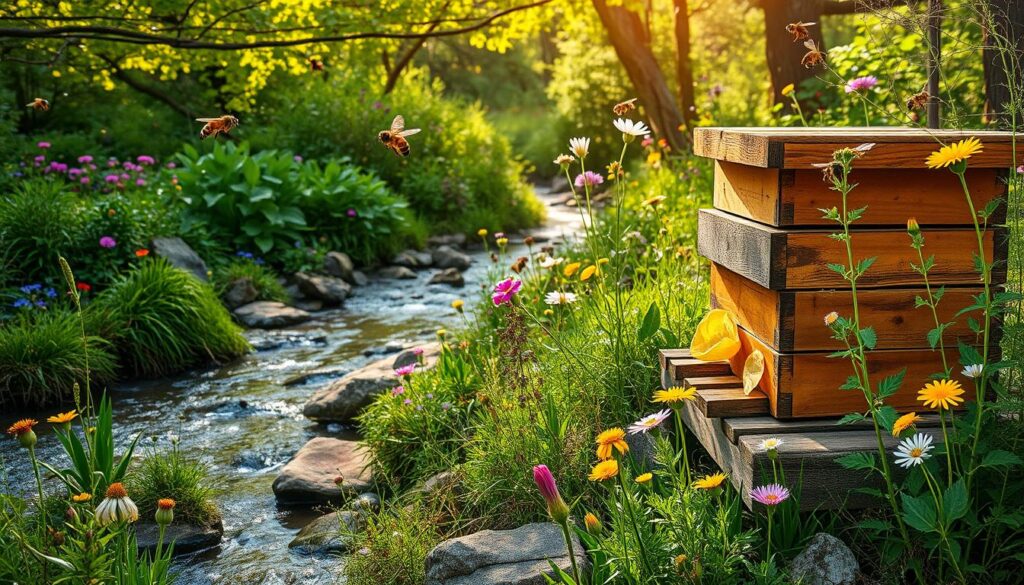
Permaculture Beekeeping: Supporting Pollinators Naturally
Permaculture beekeeping is a holistic approach that aims to support pollinators, like bees, by working in harmony with the natural ecosystem. This method focuses on creating a sustainable, diverse, and thriving environment for bees and other pollinators, rather than relying on artificial or invasive practices that can harm the local ecosystem. By adopting permaculture principles, beekeepers can play a vital role in conserving and enhancing the health of pollinator populations, while also enjoying the benefits of sustainable honey production.
The design philosophy of the Sun Hive, a hive design originating from Germany, emphasizes putting bees first before honey yields, advocating for a more sustainable approach to permaculture beekeeping. The hive’s curved frames and lack of frames in the bottom section, placed above ground level, are aimed at maximizing colony health by enabling the management of the brood nest location and progression, enhancing the overall well-being of the bees.
“The Sun Hive promotes colony health by enabling the management of the brood nest location and progression, enhancing the overall well-being of the bees.”
Experimentation and refinement of beekeeping techniques, like with the Sun Hive design, are vital for promoting honeybee health and colony resilience. Various resources exist for Sun Hive beekeeping, including booklets by the hive’s designer Gunther Muncke, workshops in the UK by the Natural Beekeeping Trust, and practitioners like Heidi Herrmann in the UK and Michael Thiele in the USA.
By embracing permaculture beekeeping practices, beekeepers can play a crucial role in supporting the natural ecosystem and ensuring the long-term health and survival of pollinators. Through sustainable, eco-friendly techniques, beekeepers can contribute to the preservation of diverse pollinator populations, fostering a more resilient and balanced natural environment.
The Role of Bees in Ecosystem Balance
Bees are the unsung heroes of our natural world, playing a vital role in maintaining the delicate balance of ecosystems. As pollinators, these industrious insects are responsible for transferring pollen from one plant to another, facilitating the reproduction of a vast majority of the world’s plants, including many food crops. Without the tireless work of bees and other pollinators, the fragile equilibrium of the natural environment would be disrupted, leading to the potential collapse of entire ecosystems.
The importance of bees in ecosystem balance cannot be overstated. Over 20,000 species of bees are known worldwide, each with its unique role to play in the intricate web of life. Bees are responsible for pollinating around 80% of all flowering plants, including 3 out of 4 crops that we rely on for sustenance. The global value of crops dependent on pollinators, such as bees, ranges between 235 billion USD to 577 billion USD per year, underscoring their economic importance.
However, the declining pollinator population is a significant concern, with factors like habitat loss, intensive farming practices, and the use of synthetic pesticides contributing to the problem. In the UK, two species of bumblebees have become extinct in the past 80 years, a worrying trend seen worldwide. The bee ecosystem role is crucial, and their declining numbers can have far-reaching consequences for the delicate balance of the natural world.
According to the Intergovernmental Science-Policy Platform on Biodiversity and Ecosystem Services (IPBES) report, more than 80 million hives of western honey bees produce approximately 1.6 million tonnes of honey annually, highlighting the importance of bees in ecosystem balance.
Preserving the health and diversity of bee populations is essential for maintaining the balance of ecosystems. Conservation efforts, sustainable practices, and individual actions like planting pollinator-friendly gardens can all contribute to protecting these remarkable creatures and ensuring the continued flourishing of the natural world.
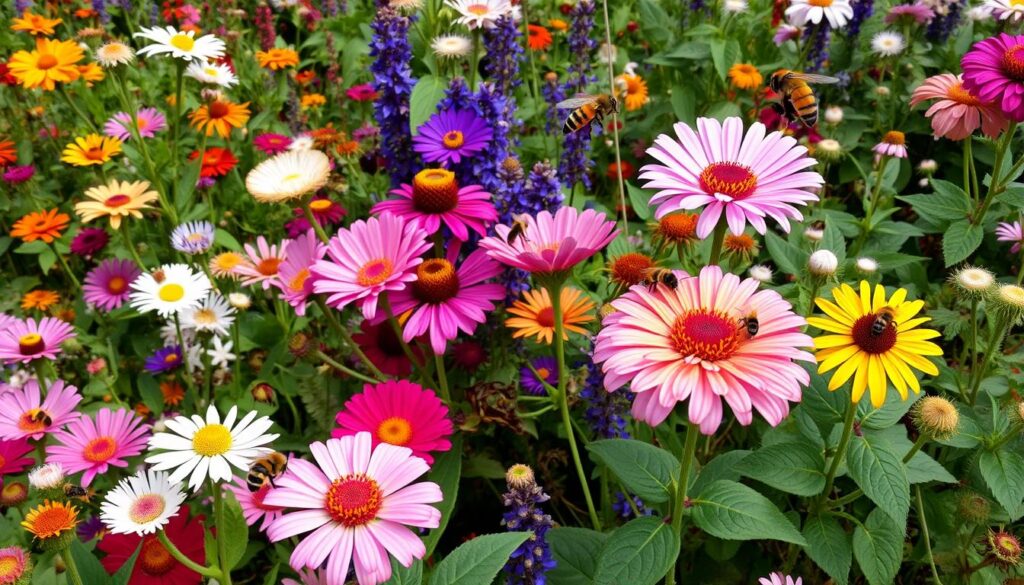
Biodynamic Honey Farming
In the world of biodynamic beekeeping, the focus is on creating a harmonious, self-sustaining ecosystem that supports the natural rhythms and needs of the bees. This specialized approach to holistic honey production aligns with the principles of permaculture, emphasizing the importance of maintaining ecological balance.
Biodynamic bee stewards approach hive management by providing a clean environment for the bees to thrive. They promote natural beekeeping methods, such as allowing bees to swarm, split colonies, and choose queens to ensure the bees can self-regulate their populations. This contrasts with conventional practices that often rely on synthetic treatments and interventions.
The biodynamic philosophy also extends to the bees’ diet. Biodynamic practitioners understand the importance of using sugar cane-based sugar for bee feeding, as around 90% of beet sugar is derived from GMO beets. Regular hive checks during warm spring days are crucial to assess the hive’s health, food supply, and queen status, ensuring the bees have the resources they need to flourish.
In instances of hive loss, biodynamic bee stewards accept it as part of natural selection, understanding that the bees will correct their own imbalances when provided with a healthy environment. Supplemental feeding options may include untreated honey, bee bread, sugar syrup, and a biodynamic “bee tea” made from sugar, water, chamomile, thyme, and sea salt.
The biodynamic honey farming approach is a testament to the power of working in harmony with nature. By creating a balanced, flourishing ecosystem, these dedicated beekeepers not only produce high-quality, nutrient-dense honey but also play a vital role in supporting the overall ecological health of the land.
Organic Pollination Practices
In the world of permaculture beekeeping, the emphasis is on embracing organic, natural pollination practices to support the health and well-being of bees and other pollinators. This includes a steadfast commitment to avoiding the use of synthetic pesticides, which can be detrimental to bees and other beneficial insects. Instead, permaculture beekeepers rely on the power of companion planting techniques, which encourage the natural control of pests and diseases.
Avoiding Synthetic Pesticides
Synthetic pesticides pose a grave threat to bee populations, as they can disrupt the delicate balance of the ecosystem and compromise the bees’ ability to thrive. Permaculture beekeepers recognize the importance of maintaining a healthy, pesticide-free environment for their apiaries. By embracing organic pollination practices, they not only safeguard the bees but also promote the overall biodiversity of the surrounding landscape.
Companion Planting
The art of companion planting is a key component of permaculture beekeeping. By strategically placing certain plants and herbs around the garden, permaculture beekeepers can create a natural defense system against pests and diseases, reducing the need for harmful chemicals. This approach not only supports the health of the bees but also contributes to the overall pesticide-free gardening efforts, fostering a thriving, resilient ecosystem.
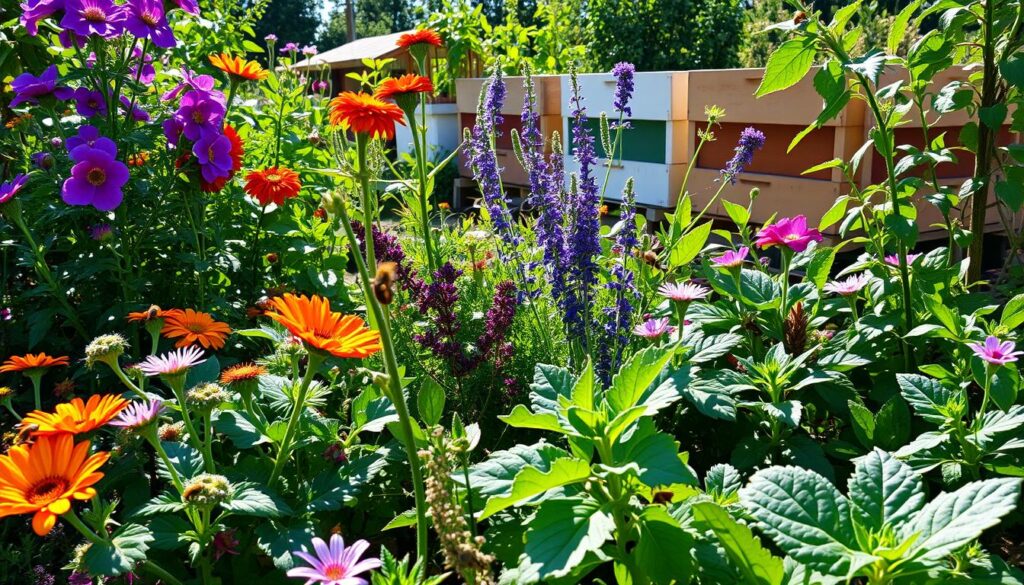
By adopting these organic pollination practices, permaculture beekeepers play a vital role in preserving the delicate balance of nature, ensuring that bees and other pollinators can continue to thrive and fulfill their essential role in the ecosystem.
Regenerative Apiary Management
Permaculture beekeeping is not just about producing honey – it’s about creating a thriving, self-sustaining hive ecosystem that supports the broader environment. At the heart of this approach is regenerative apiary management, a holistic practice that focuses on minimizing human interference and allowing bees to manage their own colony dynamics.
By adopting regenerative beekeeping techniques, permaculture beekeepers can help build robust, genetically diverse bee populations that are better equipped to withstand environmental stressors and contribute to the delicate balance of the ecosystem. This involves introducing targeted interventions to support the overall health and well-being of the hive, while also embracing the natural cycle of colony growth and reproduction.
One key aspect of regenerative apiary management is the emphasis on holistic hive management, where beekeepers work in harmony with the bees’ innate abilities to thrive. This includes observing foraging patterns, encouraging the production of nutrient-rich pollen, and providing suitable nesting environments that mimic the bees’ natural habitat.
By adopting an ecological apiculture approach, permaculture beekeepers can help to build a resilient and self-sustaining system that benefits both the bees and the broader ecosystem. This holistic approach to beekeeping not only promotes the health of the hive, but also contributes to the conservation of pollinators and the restoration of natural habitats.
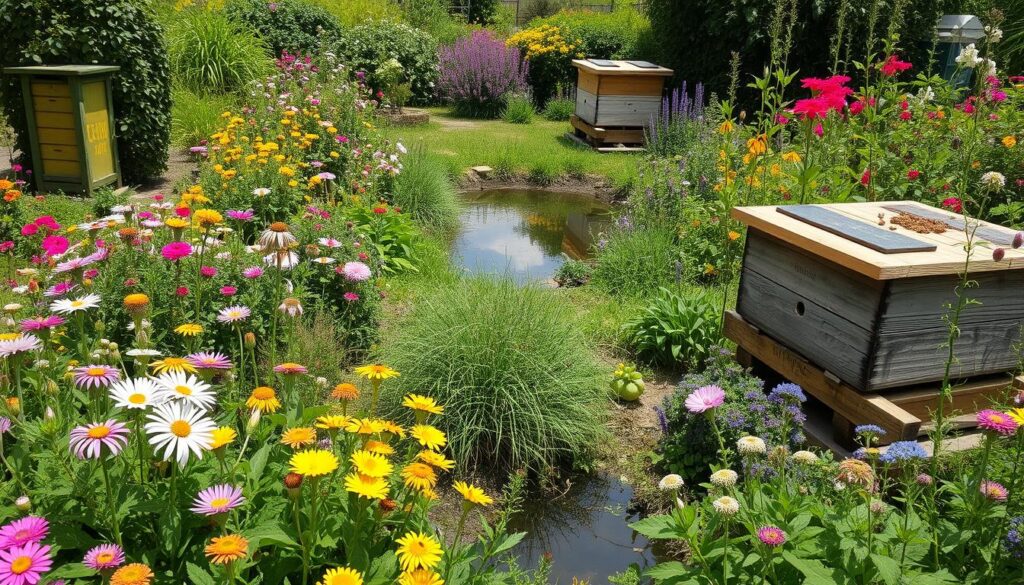
“Regenerative beekeeping is not just about producing honey – it’s about creating a thriving, self-sustaining hive ecosystem that supports the broader environment.”
Building Holistic Bee Habitats
Permaculture beekeeping emphasizes the importance of creating bee-friendly habitats that cater to the diverse needs of bees and other pollinators. This involves designing and maintaining pollinator-centric landscaping that provides a range of nectar and pollen sources, as well as shelter, nesting sites, and water sources. By incorporating features like flowering plants, insect hotels, and water features, permaculture beekeepers can help to create a thriving, sustainable bee environment that supports the overall health and well-being of the local pollinator population.
One key aspect of building holistic bee habitats is planting a diverse array of bee-friendly flowers and herbs that bloom at different times throughout the season, ensuring a constant supply of nectar and pollen. This not only benefits the bees but also promotes biodiversity by attracting a wide range of other pollinators to the garden.
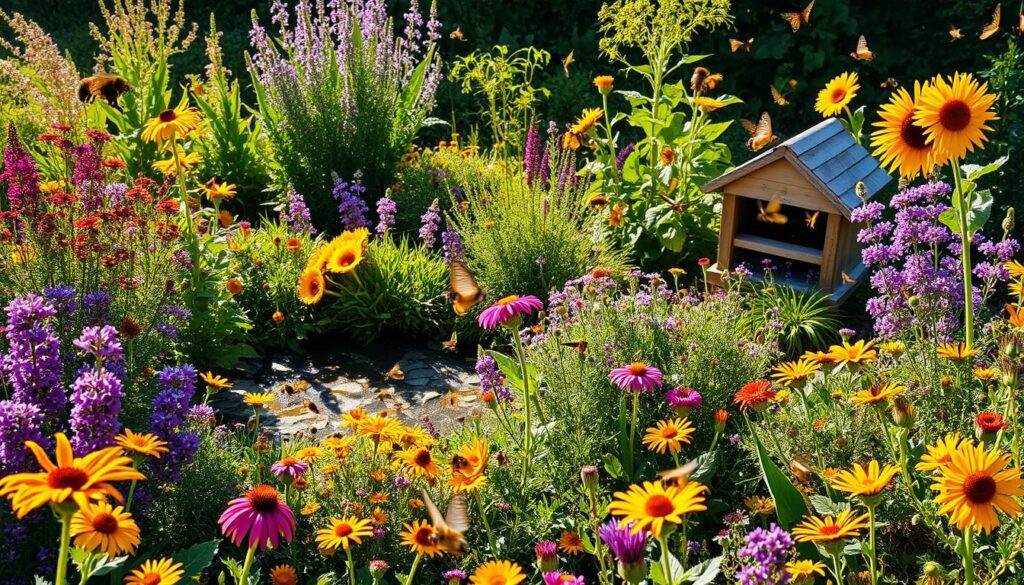
In addition to cultivating a pollinator-centric landscape, permaculture beekeepers also focus on providing shelter and nesting sites for bees. This can involve creating insect hotels or leaving patches of bare ground for ground-nesting bees. By catering to the diverse habitat needs of bees, permaculture beekeepers can help to ensure the long-term viability and resilience of local pollinator populations.
“The future of our food system and the health of our entire planet depends on the well-being of pollinators. By creating bee-friendly habitats, we can play a vital role in supporting these essential, hardworking creatures.”
Through the intentional design and maintenance of sustainable bee environments, permaculture beekeepers can foster a thriving, self-sustaining ecosystem that benefits both the bees and the wider community. This holistic approach to beekeeping is a powerful tool in the fight to protect and restore our planet’s precious pollinator populations.
Ecological Honey Production
Permaculture beekeeping prioritizes ecological honey production, which involves harvesting honey in a way that minimizes the impact on the hive and the surrounding ecosystem. This may include techniques like leaving sufficient honey stores for the bees to survive the winter, avoiding the use of synthetic treatments or feeding, and ensuring that the hive remains in balance with the local flora and fauna. By adopting these eco-friendly practices, permaculture beekeepers can produce high-quality, sustainable honey while also supporting the long-term health and resilience of the bee population.
One such company focused on natural beekeeping principles is Beckmann Urtracht, founded in 2015. They prioritize natural propagation, honeycomb built entirely by bees, natural nutrition, and minimal intervention, far exceeding requirements for organic beekeeper certification. This sustainable approach results in smaller honey harvest quantities but is distinguished by exceptional quality, taste, and ecological friendliness.
In contrast to conventional industrial beekeeping practices, sustainable beekeeping promotes letting the queen roam freely throughout the colony and only opening the hive when the temperature is close to that within the hive to avoid putting strain on the bees. Encouraging swarming as a method of increasing colonies is preferred over breeding or importing new queens, and strong bee health is prioritized to naturally control Varroa mites, instead of relying heavily on chemical treatments.
By adopting these environmentally-friendly apiculture techniques, permaculture beekeepers can ensure that their honey production not only benefits their own hives but also contributes to the overall health and resilience of the local ecosystem. It’s a holistic approach that recognizes the vital role of bees in maintaining a balanced, thriving natural world.
Sustainable Apiculture Techniques
Permaculture beekeeping emphasizes the use of sustainable beekeeping practices that prioritize the well-being of the bees and the broader ecosystem. This may include the use of natural hive designs, such as top bar or Warre hives, as well as the implementation of regenerative practices that promote the self-sufficiency and resilience of the hive. Permaculture beekeepers also focus on creating diverse, thriving habitats that support a wide range of pollinators, ensuring the long-term health and balance of the local ecosystem.
One key aspect of eco-friendly apiary management is the use of natural hive designs that mimic the bees’ natural nesting habits. Top bar and Warre hives, for instance, allow the bees to build their own comb and maintain a more natural, stress-free environment. These hives also minimize the need for invasive management practices, such as frequent inspections and honey harvesting, which can disrupt the colony’s natural rhythms.
In addition to hive design, holistic apiculture emphasizes the importance of regenerative practices that support the long-term viability of the bee population. This may include measures like providing year-round forage resources, avoiding the use of synthetic pesticides, and promoting biodiversity through companion planting and other ecological techniques. By working in harmony with the natural processes of the hive, permaculture beekeepers can ensure the sustainability of their apiaries while contributing to the overall health of the local ecosystem.
“The health of honeybees is closely tied to the availability of an unpolluted, flower-rich local environment. Sustainable beekeepers aim to protect and sustain viable populations of healthy, indigenous honeybees.”
Through the adoption of sustainable beekeeping practices, eco-friendly apiary management, and a holistic apiculture approach, permaculture beekeepers can play a crucial role in supporting the resilience of pollinator populations and fostering the long-term balance of natural ecosystems.
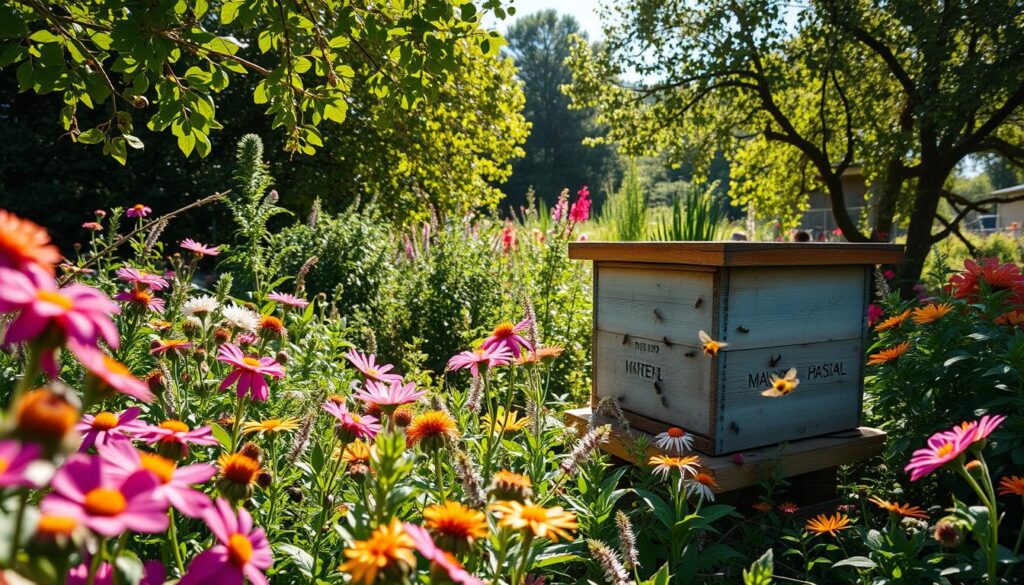
The Joys of Permaculture Beekeeping
Permaculture beekeeping offers a deeply rewarding and fulfilling experience for those who are passionate about supporting pollinators and working in harmony with the natural world. By engaging in this holistic approach to beekeeping, individuals can develop a profound connection with nature, as they witness the intricate workings of the hive and the vital role that bees play in maintaining the balance of ecosystems.
Connection with Nature
Through permaculture beekeeping, individuals can forge a deep connection with the natural world, fostering a heightened sense of stewardship and appreciation for the delicate balance of the ecosystem. As they observe the bees’ intricate dances and witness the vital pollination services they provide, beekeepers gain a newfound respect and wonder for the intricate web of life that sustains our planet.
A Meditative Practice
In addition to the profound connection with nature, permaculture beekeeping can also serve as a meditative practice. This approach to beekeeping requires patience, observation, and a deep respect for the bees and their needs. By embracing a hands-off and minimally invasive approach, permaculture beekeepers can cultivate a sense of calm and mindfulness, finding solace in the rhythmic hum of the hive and the quiet contemplation of their work.
